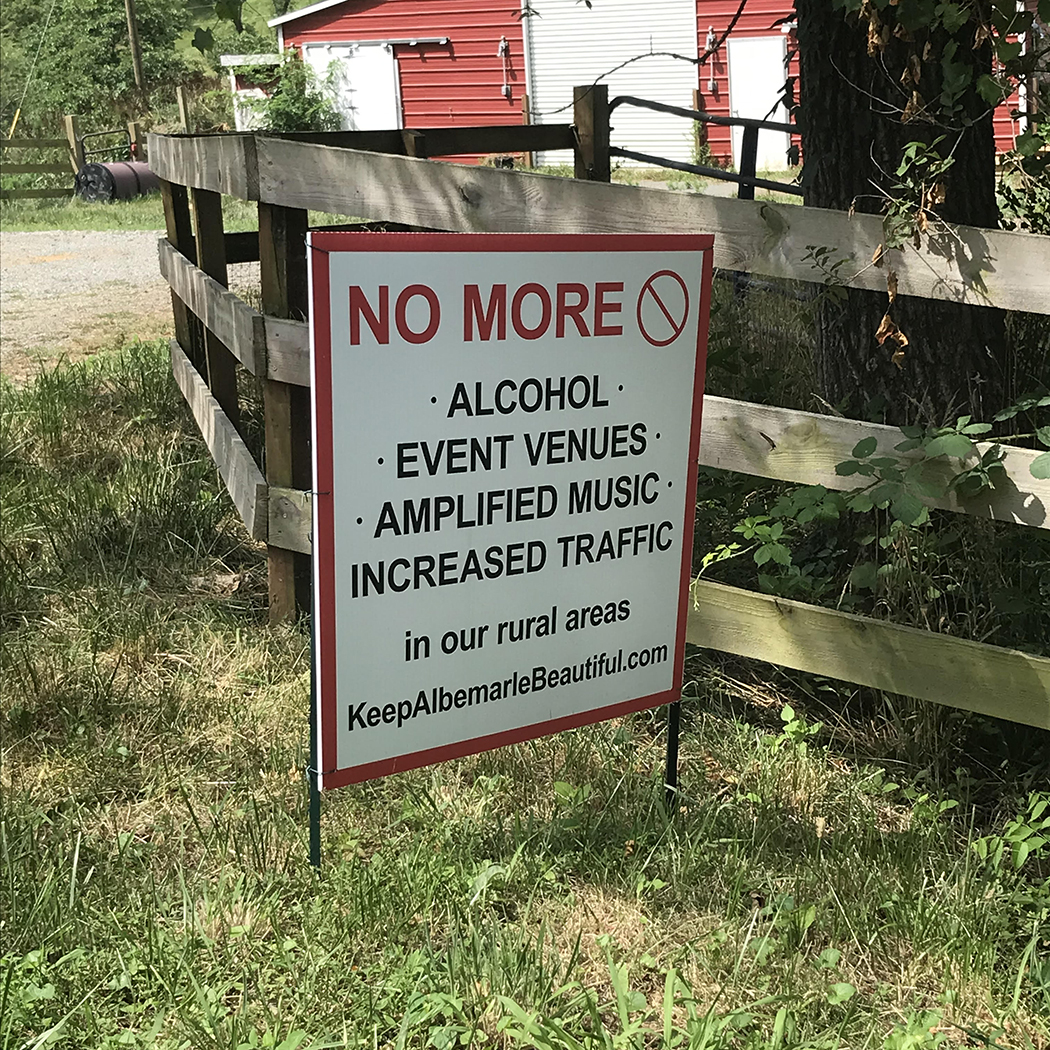By Danny O’Dea
All along Route 151, breweries and wineries dot the sides of the road. This beautiful, hilly stretch of Nelson County highway is known around the state for its picturesque watering holes.
Take a turn down the more residential Dick Woods Road, however, and you’ll see signs with bold letters that read “NO MORE ALCOHOL, EVENT VENUES, AMPLIFIED MUSIC, INCREASED TRAFFIC IN OUR RURAL AREAS. KEEP ALBEMARLE BEAUTIFUL.” Something has ruffled the feathers of nearly every homeowner on the narrow, windy road, and they want you to know it.
The object of residents’ ire is a new vineyard and event space called Hazy Mountain Vineyards & Brewery, which has been under construction for the last two years and finally opened its doors this month. Neighbors say the property poses traffic, noise, and congestion concerns for their quiet rural street, and that the developers pushed the limits on their construction permits when planning their facility.
Hazy Mountain did not respond to multiple requests for comment.
“Part of the reason the community got upset is how they went about it,” says Dick Woods Road resident Don Fender. From a seat on Fender’s porch, the newly planted grapevines can be seen covering the mountain. A narrow, winding driveway cuts its way up to the peak through the rows.
Hazy Mountain’s developers bought the 167-acre property for $5 million in 2018. It didn’t take long for them to fell the mountaintop’s trees to make room for grapevines, and set up two event barns, each over 7,000 square feet. The property also has a parking lot with the capacity to hold multiple 200-person events simultaneously.
“We had no idea what was going on up there,” Fender continues.
Hazy Mountain was allowed to construct such a large spread because the project is classified as a farm winery, a designation with looser rules than a standard commercial business. The idea is to make life easier for small farmers looking to sell their products.
“The things they’ve done on the property regarding sight lines, traffic, and building limitations are things that residential developments would never be allowed to do,” Fender says.
“My husband and I live directly across the road from Hazy Mountain Vineyard and have had serious concerns about it since [they] began clearcutting in March of 2018,” says Cathy Robb, another Dick Woods resident.
Robb feels the developers took advantage of a loophole and that the county should have intervened. “Despite our requests for intervention and oversight, every single person in authority in Albemarle County has turned a blind eye to what is clearly a commercial operation,” she says.
Residents are also concerned about the traffic issues the new vineyard could bring. According to Bruce Snerling, who can see the exit from his front porch, the turn onto Dick Woods has already been the site of a handful of fender benders. In the past, the bulk of the traffic on the road was the Western Albemarle cross country team doing weekend runs.
Ann Mallek, who represents the White Hall District on the Albemarle County Board of Supervisors, has heard plenty of complaints about the project.
“A lot of times it feels like we on the local government side of things end up playing defense when we wish we could play offense,” she says. Traffic is one of those issues: She says Albemarle County had the most highway deaths of any county in Virginia in 2017.
“We tried to get [the Virginia Department of Transportation] to approve signs at a four-way intersection in Earlysville for years,” Mallek continues. “The day after a fatal car accident is the day they finally were put in place. …We don’t want to be put in the spot of waiting for a tragedy again.”
With the vineyard now open, angry Dick Woods Road residents are hoping to see the rules change going forward.
“There were many issues and concerns from the start of this project but…it is somewhat of a moot point since they are now open for business,” Fender says. “I think people in the rural areas should be concerned if such large enterprises as Hazy Mountain can be developed under the zoning rules and regulations of agricultural zoning.”
Mallek says the Board of Supervisors is looking into the situation.
“Just last week we had a meeting to discuss our priorities for the next year, and we moved to the top of the list looking into changing the legal definitions of what constitutes an agricultural enterprise,” she says. “Starting to separate out things like cows and corn from things like wineries.”
“The people who live here have already made an investment in the land and in themselves,” Mallek says. “We need to be smart about the land. Our quality of life depends on others.”








